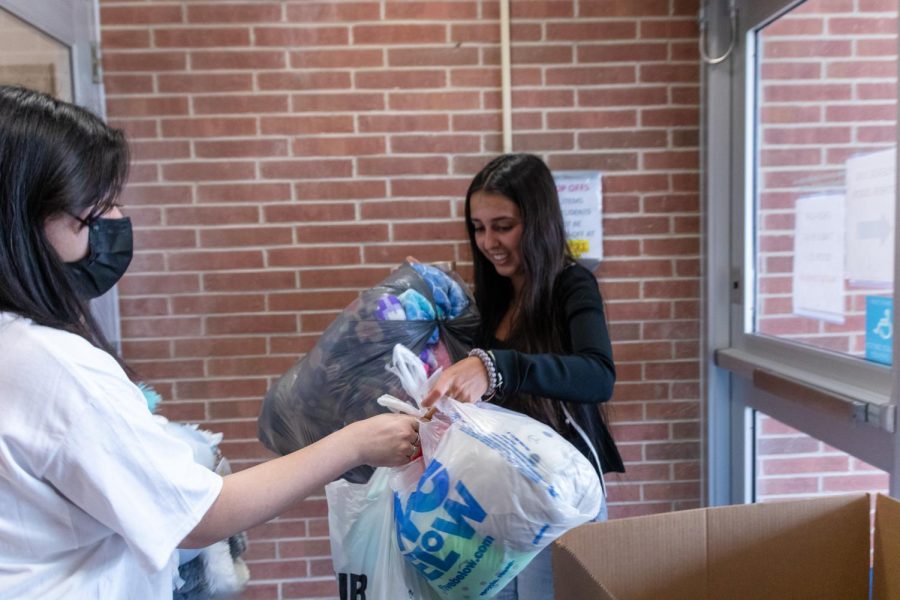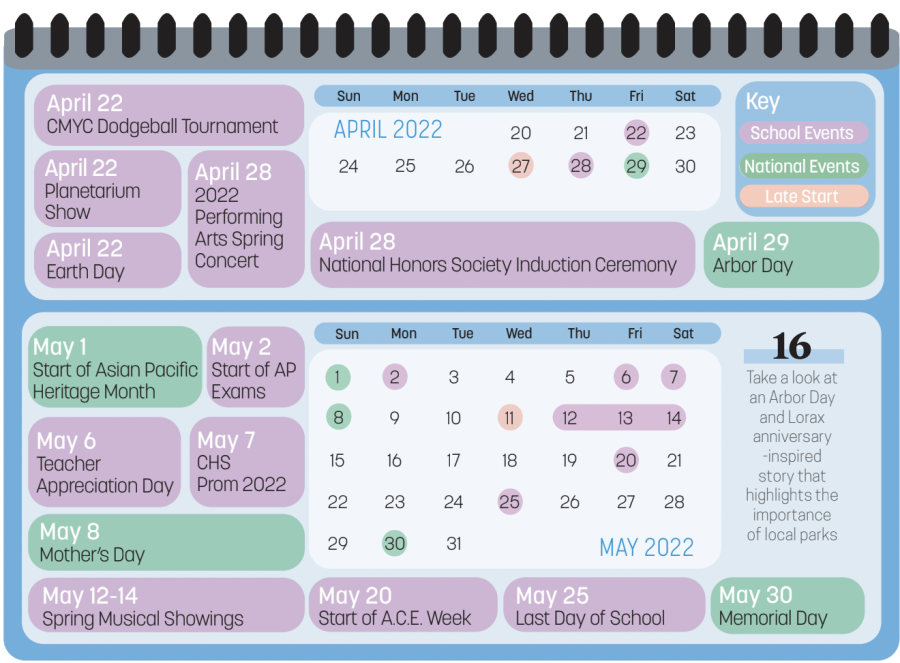Like any kid his age, sophomore Zach Miller has spent a fair amount of time in cars. However, the cars Miller has ridden in are a big different from the ones most people remember from their childhood.
As the son of Sergeant Adam Miller, a police officer under the Carmel Police Department, Miller has had experiences most teenagers haven’t. One of his earliest memories is of riding his father’s Crown Victoria police car at the age of 2.
 “Honestly, my entire life, it’s been pretty normal; everything’s just around me. I mean, everybody else thinks it’s cool and weird, but it’s just part of my life,” Miller said.
“Honestly, my entire life, it’s been pretty normal; everything’s just around me. I mean, everybody else thinks it’s cool and weird, but it’s just part of my life,” Miller said.
When Miller found out about the death of Michael Brown, a man fatally shot by a police officer in Ferguson, MO, and later of Eric Garner, a man who died after a police officer put him in a chokehold in Staten Island, NY, he said he didn’t know what to think at first.
“Initially I thought, well, I didn’t know what to think. I was going to wait for all the details to come out because I hate reading stories when I don’t know everything,” Miller said.
Miller said finding out what happened to Michael Brown and Eric Garner was troubling. While he wasn’t sure how events would unfold after the incidents, he said, he was sure tension and more problems would arise.
“Tensions, whatever you want to call it in America, and the police, things I thought were another story that could either look really bad for white people, police officers or just America in general, and I just knew it would end badly,” Miller said.
According to Pew Research Center, a nonpartisan and nonprofit organization, and USA Today, a 2014 poll of more than 1,500 adults across America revealed that 64 percent believe police departments are doing an “only fair” job or a poor job of holding police officers accountable for misconduct, which has resulted in a decline in trust in the police department.
While Miller said he could understand how people may have lost trust in law enforcement after the deaths of Michael Brown and Eric Garner, he said he is frustrated that people tend to make large generalizations about law enforcement as a result.
“(Policemen) are trying to do good,” Miller said. “There are a ton of great ones for just one bad. It’s like that for anything. It’s easy to get stereotyped when people see you as a threat when you’re just there to help them. I’ve said this a million times, but it really bugs me when it only takes one weak link in the chain to break it.”
Dr. Ramla Bandele, an associate professor who teaches American politics, urban politics and African American politics at IUPUI, said mistrust in police comes not only from any encounter but also the neighborhood or community.
“It depends on the neighborhood, area or town,” Bandele said. “So, if you’re talking about Carmel or Brownsburg, even Broad Ripple, they see police as protectors, for the most part, and rarely will they be concerned with how police use their power. In a poor community, it’s about the opposite. Because people are stopped so much, assumptions are made based on race and neighborhood.”
Pitfalls of Generalization
Carmel police officer Shane VanNatter has served as a police officer for 14 years, and he has worked as a school resource officer at CHS for six years; previously, VanNatter served in the Marine Corps for five years. VanNatter said while people form their own opinions and come to their own conclusions, the media still maintains a large influence over public perception when it comes to the popular view of police.

“I remember on Sept. 10, 2001, before 9/11 happened, people would call cops ‘pigs’ and talk bad about police officers, make jokes about donuts and that kind of stuff, and suddenly on Sept. 12, the day after 9/11, we’re heroes,” VanNatter said. “All of a sudden, people are walking up to me in public, shaking my hand, thanking me for what I do, buying me even a lunch when I’m out having lunch on duty. And what did I do different from Sept. 10 and Sept. 12? I did exactly the same job I had always done, but it was the perception people had from the media, and the media portrayed cops as heroes who went in and saved lives, and now, some are portraying police officers as racists, so all of it is how the media portrays people.”
VanNatter said he acknowledges there are some bad police officers but said he believes it is wrong to make assumptions about every police officer based on the actions of one.
“Just like in any other profession, there are racists, angry people, there are hateful people, there are ignorant people, and I don’t want to work with those officers,” VanNatter said. “If there are police officers like that out there, I think they should be fired. But just like how there are bad police officers, there are (bad) doctors, there are bad lawyers, bad teachers, and principals and firemen and businessmen, and so to say that you just can’t trust the police, I mean, the police is just a segment of society like any other.”
Bandele also said she believes stereotyping not only police officers but also people in general is an inaccurate way to form assumptions.
“(Trust in law enforcement) depends upon environment and situations but also assumptions on people,” Bandele said. “You know, all black youth are not involved in crime … and it speaks to professionalism. If you are a police officer, you have to make decisions, snap judgments, and I understand that. But other times, you don’t. So, (policemen) just have to keep reminding themselves that they should not arrest a person or stop a person based only on color.”
Another Side of the Story
Senior Jordan Barkley found out about the deaths of Michael Brown and Eric Garner the way most people his age probably did: He read about it online, through social media. While he said he wasn’t sure what to think of the Ferguson case due to the amount of evidence, he said he was shocked at the outcome of the Eric Garner case.
“So, for Ferguson, I opted to wait it out and wait until actual information came because what I was reading, I felt a lot might be biased,” Barkley said. “When I saw the Garner video, I watched it all the way through, and I was just appalled. It was just disgusting to see something like that … I’m not saying it because I’m African American or because I’m 17 and I think the police are terrible people. I’m saying it because a dude died and the guy wasn’t even penalized, or the group, I guess.”
In the same 2014 poll by Pew Research Center and USA Today, 44 percent of people said they had “not too much” or no confidence in police departments’ ability to use military equipment properly. Barkley said he thinks the poll is accurate, especially after recent events, because people realize how much power the police can have.
“I think it’s very accurate,” Barkley said. “Not just with police but also with people and weapons, you have a certain amount of power you hold. I’ve been to a shooting range. I know what it’s like. It’s a pretty powerful feeling.”
Same but Different

While the deaths of Michael Brown and Eric Garner were both caused by encounters with law enforcement, Miller said he sees the Ferguson shooting and the Eric Garner cases in different ways due to the nature of each situation.
“I think they’re unrelated incidents because (in the death of Michael Brown), the cop was protecting himself, while (the death of Eric Garner) was more aggressive and fueled by other things in the background. There were better ways to handle the situation,” Miller said.
Like Miller, Bandele said the two cases are different. However, she said she sees the cases differently because the Eric Garner situation was recorded, while the Ferguson shooting was not.
“First of all, one is on camera,” Bandele said. “You can see the entire incident of what happened. In Ferguson, that was not the case. There were only eyewitnesses, people who witnessed it, and let me just say that law enforcement and the court suggested that eyewitnesses may be sincere, but oftentimes they get it wrong. So, what we have to go on in Ferguson was the fact that people said how this whole thing unfolded, and so you either have to believe them or not believe them. In New York, with things on camera, you don’t have to believe anybody. Just yourself.”
According to The Indianapolis Star, law enforcement officials in Indianapolis began a body-camera pilot program in December 2014. VanNatter said the Carmel Police Department has also tested some body cameras, and he likes the idea of wearing cameras because it provides an account of what happened and he knows he follows proper procedures when he’s on duty.
“I like having cameras, and the main reason is that I know that I’m doing things properly. So, I don’t mind being recorded. I figure, even if I don’t bring a camera, somebody’s still recording me,” VanNatter said.
Miller also said he believes more cameras on and around policemen will be helpful because they will expose any police officers who are not following proper procedures.
“I think the cameras are a good way to restore integrity, because people can say anything, and at least one person will think it’s the truth for any story, so I think real evidence is great, because no one can dispute that,” Miller said.
However, VanNatter said while cameras are a great source for evidence, cameras cannot capture the subtleties a police officer may see.
“You could put a camera on my helmet, and I could wear it around 24 hours a day, and it will never capture all the things that a person can perceive. The subtle indicators, the body language, the hesitation of somebody’s response, things that an officer is trained to pick up on, you may not catch on a camera, so you can’t trust that a camera is the end-all solution to our problems,” VanNatter said.
Impact of Social Media

Since the death of Michael Brown and Eric Garner, there have been trends on Twitter such as #BlackLivesMatter and #RIPMikeBrown as a way for people to express their opinions on the recent situations. When Miller sees people respond to controversial cases through social media, he said he believes it does not help the situation.
“I’ve seen things like #RIPMikeBrown and the NBA players wearing shirts or some of the NFL (players). I don’t think it’s good in any way because you can’t change the events, and you’re just adding fuel to a fire,” Miller said.
Miller said people should look beyond social media if they want to have a greater impact on their community and the overall public.
“I don’t think forcing people to believe what you want over social media is good because, best-case scenario, you just made your argument compelling and started more tensions within America. I think that people, if they really want to make a decision, they should talk to their leaders of Congress, not just complain and say hateful things on the Internet. They should try to take action and become activists,” Miller said.
Since the death of Eric Garner, there have been over 50 peaceful protests in New York. Bandele said she believes if people want to be heard, they need not only to peacefully protest but also to be more involved with their community and in politics, especially in Ferguson.
“(The people in Ferguson) need to vote in every election, and people, sometimes they just think, ‘Nothing’s going to change if I vote.’ Oh yes, it will. Yes it will. I mean, not in the way you might want to change, but the dynamics will change. The dynamics in court will change, because the politicians will represent the population,” Bandele said.
Bandele also said while recent events may have seemed like just African-American communities trying to be heard, the want for reform and change within the police is shared among all.
“You saw pictures after the shootings, and there was diversity in the crowd,” Bandele said. “There were white people, there were Latino people, there were Asian people, there were older people, there were younger people, and they have the right to protest, and in that instance, they were saying, ‘The police, you’re wrong, we want you to stop this, and pay us attention and listen to what it is that we’re trying to say to you.’”
Miller said in order for citizens to feel like they can trust law enforcement, they need to have positive relations with officers.
“I think that (people who do not trust law enforcement) will, either in life, they will just go through, mistrusting people, which is their problem, or they can be converted to trusting them if they have a good experience with them,” Miller said.
Like Miller, VanNatter said he believes community outreach programs would help improve the relationship between the police and the citizens. According to VanNatter, the Carmel Police Department has several community outreach programs geared towards different age groups.
“We have several community programs,” VanNatter said. “For example, in the summer, for teenagers, we have a Teen Police Academy, so in the summertime, we have two weeks where we take two groups of students, and they basically go through an abbreviated version of the police academy, and they get to do police training, and they get to learn all about the police department. We have a Citizen’s Academy for adults. It’s a number of weeks where adults come in, and they get classes with officers, and they can ride along, which is another neat thing, that the community can come in, and they can ride with the police department of Carmel.”
While Miller trust law enforcement, he said, he understands how people in a different situation could feel differently. However, according to him, the key to real change is to be open to what others think.
Like Miller, Barkley said he believes that people, to approach difficult situations, need to be willing to listen to what others have to say.
“I just think people should be open-minded in general. I think everybody deserves that (respect). We are a democratic government, right? Or, at least, that’s what we’re supposed to be. Everyone should have a say at least,” Barkley said. “Nothing is ever set in stone, perfect. It’s the United States; we aren’t perfect.”































![British royalty are American celebrities [opinion]](https://hilite.org/wp-content/uploads/2024/03/Screenshot-2024-03-24-1.44.57-PM.png)




















![Review: “The Iron Claw” cannot get enough praise [MUSE]](https://hilite.org/wp-content/uploads/2024/04/unnamed.png)
![Review: “The Bear” sets an unbelievably high bar for future comedy shows [MUSE]](https://hilite.org/wp-content/uploads/2024/03/unnamed.png)
![Review: “Mysterious Lotus Casebook” is an amazing historical Chinese drama [MUSE]](https://hilite.org/wp-content/uploads/2024/03/0.webp)
![Thea Bendaly on her Instagram-run crochet shop [Biz Buzz]](https://hilite.org/wp-content/uploads/2024/03/IMG_0165-1200x838.jpg)
![Review: Sally Rooney’s “Normal People,” is the best book to read when you are in a time of change [MUSE]](https://hilite.org/wp-content/uploads/2024/03/20047217-low_res-normal-people.webp)
![Review in Print: Maripaz Villar brings a delightfully unique style to the world of WEBTOON [MUSE]](https://hilite.org/wp-content/uploads/2023/12/maripazcover-1200x960.jpg)
![Review: “The Sword of Kaigen” is a masterpiece [MUSE]](https://hilite.org/wp-content/uploads/2023/11/Screenshot-2023-11-26-201051.png)
![Review: Gateron Oil Kings, great linear switches, okay price [MUSE]](https://hilite.org/wp-content/uploads/2023/11/Screenshot-2023-11-26-200553.png)
![Review: “A Haunting in Venice” is a significant improvement from other Agatha Christie adaptations [MUSE]](https://hilite.org/wp-content/uploads/2023/11/e7ee2938a6d422669771bce6d8088521.jpg)
![Review: A Thanksgiving story from elementary school, still just as interesting [MUSE]](https://hilite.org/wp-content/uploads/2023/11/Screenshot-2023-11-26-195514-987x1200.png)
![Review: When I Fly Towards You, cute, uplifting youth drama [MUSE]](https://hilite.org/wp-content/uploads/2023/09/When-I-Fly-Towards-You-Chinese-drama.png)
![Postcards from Muse: Hawaii Travel Diary [MUSE]](https://hilite.org/wp-content/uploads/2023/09/My-project-1-1200x1200.jpg)
![Review: Ladybug & Cat Noir: The Movie, departure from original show [MUSE]](https://hilite.org/wp-content/uploads/2023/09/Ladybug__Cat_Noir_-_The_Movie_poster.jpg)
![Review in Print: Hidden Love is the cute, uplifting drama everyone needs [MUSE]](https://hilite.org/wp-content/uploads/2023/09/hiddenlovecover-e1693597208225-1030x1200.png)
![Review in Print: Heartstopper is the heartwarming queer romance we all need [MUSE]](https://hilite.org/wp-content/uploads/2023/08/museheartstoppercover-1200x654.png)























![Review: Ladybug & Cat Noir: The Movie, departure from original show [MUSE]](https://hilite.org/wp-content/uploads/2023/09/Ladybug__Cat_Noir_-_The_Movie_poster-221x300.jpg)

![Review: Next in Fashion season two survives changes, becomes a valuable pop culture artifact [MUSE]](https://hilite.org/wp-content/uploads/2023/03/Screen-Shot-2023-03-09-at-11.05.05-AM-300x214.png)
![Review: Is The Stormlight Archive worth it? [MUSE]](https://hilite.org/wp-content/uploads/2023/10/unnamed-1-184x300.png)




